Ireland’s Climate Change Assessment
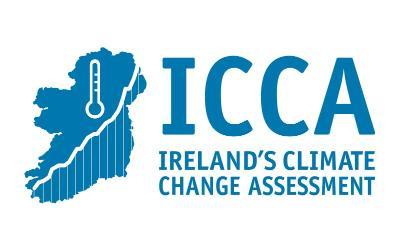
Ireland’s Climate Change Assessment (ICCA) for the first time provides a comprehensive and authoritative assessment of the state of knowledge around all key aspects of climate change, with a central focus on Ireland. The objective of Ireland’s Climate Change Assessment (ICCA) is the following:
- To deliver a comprehensive report on our understanding of climate change.
- The option to respond to the challenges it poses.
- To identify opportunities that may arise from the planned transition to a climate neutral, biodiversity-rich, environmentally sustainable and climate resilient economy and society.
The report provides an assessment of our understanding of climate change, tying together all available lines of evidence to provide actionable information. This is based on scientific research and systematic observations in Ireland, linked to EU and global analysis. ICCA aims to provide summary information that can inform decision-making on climate actions.
ICCA also covers the following:
- Identifying research gaps to inform future research investment needs and priority research issues.
- Contributing to the development of a national assessment and analysis capacity.
- Enhancing engagement with similar developments at European and international levels.
- Establishing a structure and process to develop future reports.
The ICCA report is provided in four volumes. Each volume includes a short Summary for Policymakers. Accompanying the four volumes is a Synthesis Report which integrates key findings across the underlying volumes and provides an accessible overall summary.
Synthesis Report
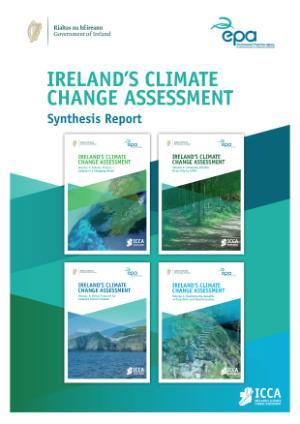
The Synthesis Report acts as a concise summary of the most important science on climate change presented in the underlying volumes. Selected findings that are deemed of the highest policy and societal relevance from each underlying volume are integrated into the report. The synthesis report highlights the underlying volumes details, where the interested reader can discover further information.
Volume 1: Climate Science - Ireland in a changing world
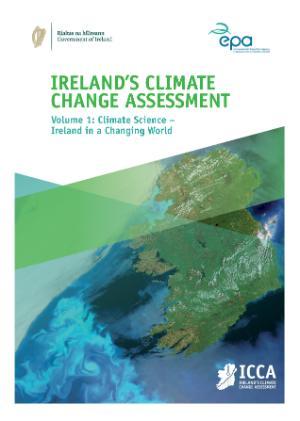
Volume 1 focuses on the state of knowledge of the physical science basis of climate change, both globally and nationally.
The volume contains information published from the IPCC AR6 WGI report, as well as material from the relevant Special Reports from the IPCC and various state agencies including EPA Ireland, Met Éireann and the Marine Institute.
The volume updates and extends the analysis provided in the National State of Knowledge Reports on climate change (2012, 2017), and consolidates the current and ongoing research into climate change in Ireland, the observed changes in the climate system as well as future climate projections for Ireland.
Read more about the authors of this volume.
Volume 2 - Achieving climate neutrality by 2050
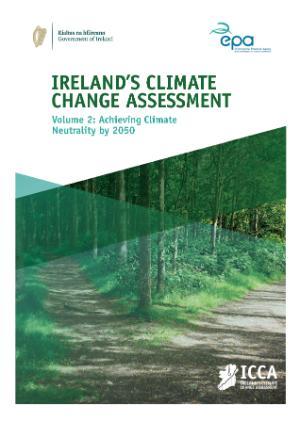
Volume 2 aims to address achieving climate neutrality by 2050 by investigating and assessing three key areas:
- Mitigation pathways and what form reducing emissions over time may take.
- Assessing the factors that may result in a climate-neutral society, including energy use, land use and the emissions landscape.
- Assessing what may make change possible by building on societal dimensions and investigating policy implications.
Read more about the authors of this volume.
Volume 3 - Being prepared for Ireland’s future climate
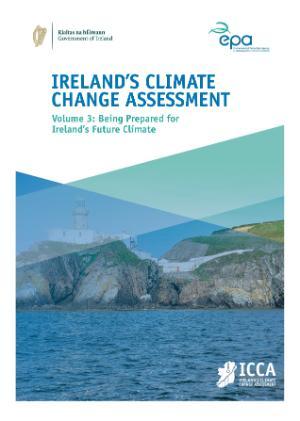
Volume 3 covers the impacts we are likely to face and how we can prepare for these changes in an Irish context.
It incorporates the latest projections from Ireland-specific climate modelling initiatives from ICHEC and Met Éireann. As well as impact modelling and social research into community resilience and wellbeing.
The report covers a range of sectors, including biodiversity, critical infrastructure, health, and the co-dependencies between them. It looks at a broad spectrum of research undertaken in Ireland on climate impacts, while also covering best practices in the IPCC's Sixth Assessment Report.
The report provides knowledge on the following:
- Research and policy gaps in Ireland.
- On cross-cutting issues and concepts framing adaptation in Ireland.
- On the practical steps required to build community involvement and participation to deliver a more climate resilient Ireland.
Volume 3 builds on the fundamental science basis covered in Volume 1, including the co-benefits and synergies with carbon neutrality measures addressed in Volume 2. And concepts such as transformative adaptation and just transitions are further explored in Volume 4.
Read more about the authors of this volume.
Volume 4 - Realising the benefits of transition and transformation
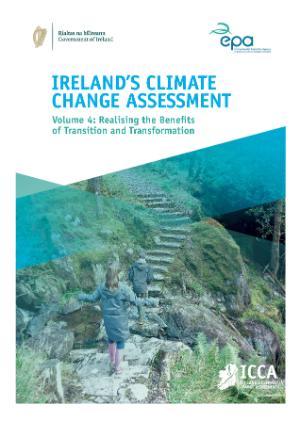
Volume 4 highlights the benefits, opportunities and synergies that can be achieved through transformation, and how they can be realised. This volume is a state-of-the-knowledge assessment that draws on global synthesis literature, including the IPCC and the Intergovernmental Science-Policy Platform on Biodiversity and Ecosystem Services (IPBES), international peer-reviewed and grey literature to identify key characteristics of transformative change. It explores the emergence of these characteristics in the national context. Knowledge gaps are highlighted to inform and enhance research related to transformations in Ireland. This volume aims to aid national policy discussions toward enabling, catalysing and achieving transformative change and associated benefits.
Read more about the authors of this volume.
An Independent Commentary with personal reflections from Professor Tim O’Riordan is available to accompany the reports.